Facts About Home Schooling
Home schooling is becoming an increasingly popular option for parents who want to have more control over their child’s education. According to the National Home Education Research Institute, the number of home-schooled students has been growing by about 7% each year since 2007.
The below image is from Thinkimpact which shows the number and age of homeschooled students from 1999 to 2020 in the US.
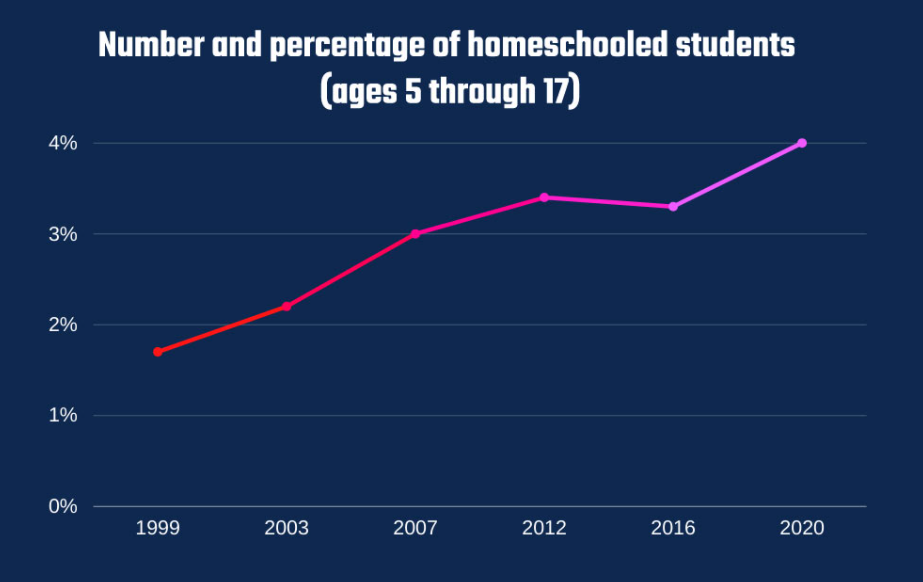
The report shared many findings and below are two key statistics we found in the report.
Until 2019, the number of homeschooled students had been growing by between 2% to 8% each year.
From 2019 to the fall of 2020, the percentage of homeschooled students changed from 3.4% to 9%.
Here is another image I found showing the growth of home schooling in the US over the last 40 years.
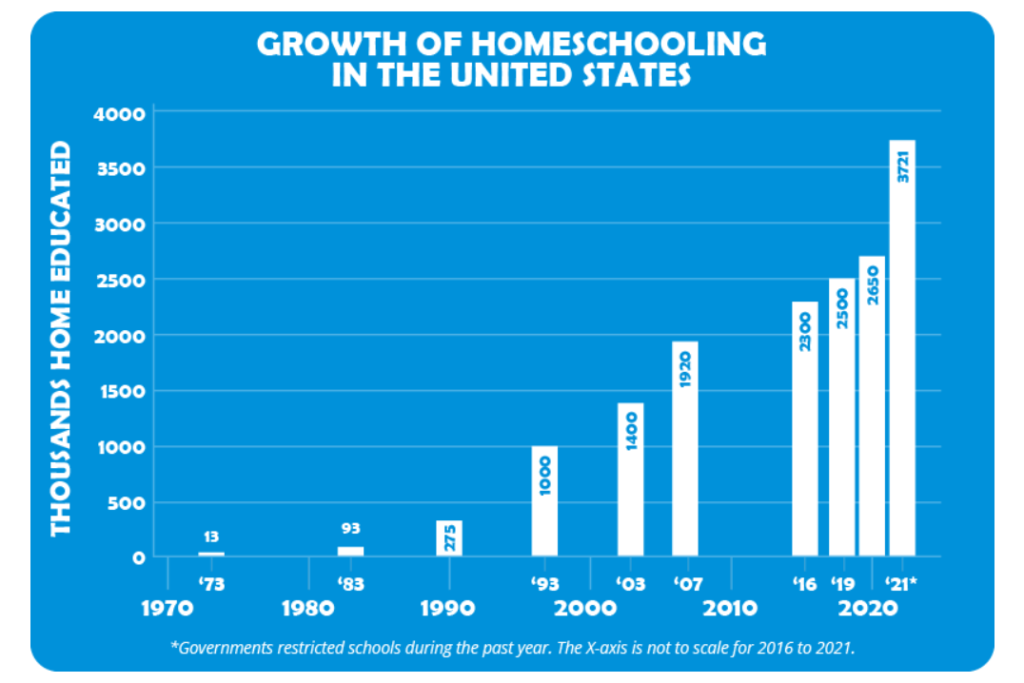
Source Image: Homeschool Statistics
And here is the growth of homeschooling in the UK up to 2018.
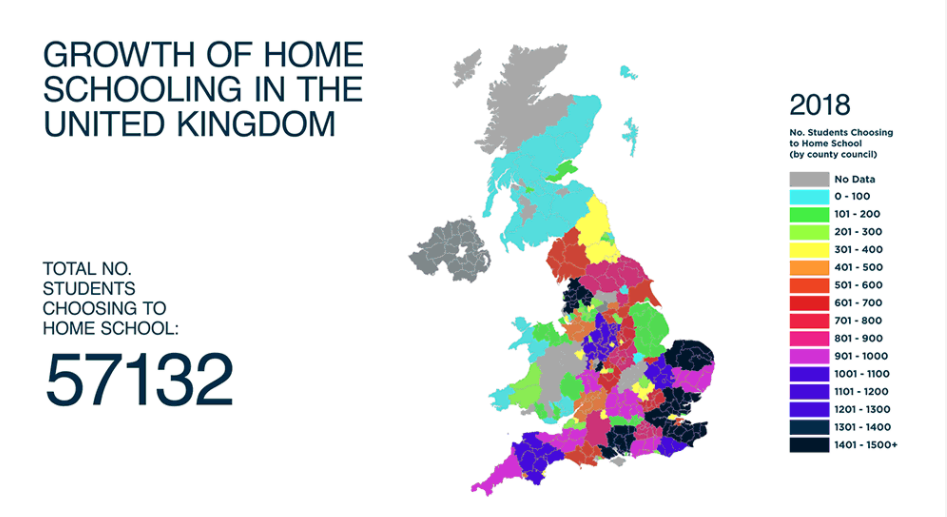
Source Image: Growth of Homeschooling in the UK
Home education in the UK has seen a 130% increase since 2013 and continues to grow each year.
There are many reasons parents choose to home school their children, but one of the most common is the belief that they can provide a better education than what is available in traditional schools.
In this blog post, we will discuss six fascinating facts about home schooling!
1: Home-schooled students outperform traditional school students on standardized tests.
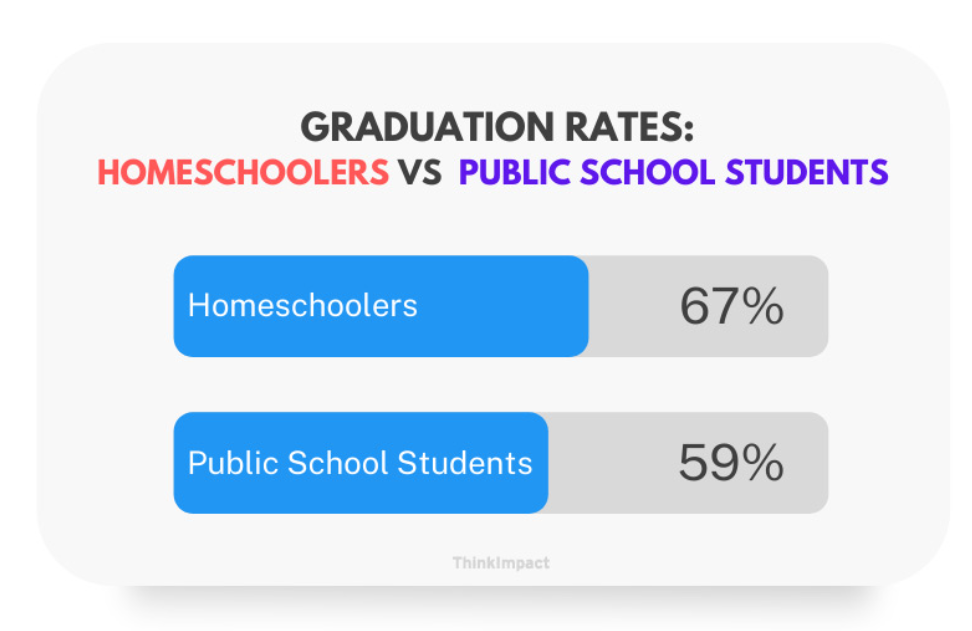
Source Image: Homeschooling Statistics
One of the most common arguments against home schooling is that children who are homeschooled will not be able to compete with traditionally educated children when they enter the workforce.
However, a study by The Home School Legal Defense Association found that home-schooled students actually perform better than their traditionally schooled peers on standardized tests. In fact, the average SAT score for home educated students is higher than the national average!
The study which was was released in 2009 and was callled “Homeschool Progress Report 2009” went on further to share the following facts:
“Homeschoolers are still achieving well beyond their public school counterparts—no matter what their family background, socioeconomic level, or style of homeschooling.”
There have been many studies over the years on this subject and another one from (Ray, 2017) shared the following:
69% of peer-reviewed studies on success into adulthood (including college) show adults who were home educated succeed and perform statistically significantly better than those who attended institutional schools
2: Parents have more control over the curriculum in a home-schooling environment.
When parents choose to send their children to traditional schools, they are often at the mercy of what the school decides to teach. However, when parents home educate their children, they have complete control over the curriculum.
This allows parents to tailor the education to fit their child’s needs and interests, which can be especially beneficial for students who are struggling in a traditional school setting.
Plus you can also allow your child to chose what they want to learn about which helps no end, my son really enjoys art so we do lots of different things related to art, and you can bring other subjects into it like history, science etc.
3: Home-schooled students get more one-on-one attention.

One of the main benefits of home education is that students receive more individualized instruction than they would in a traditional school setting.
In most cases a classroom has up to 30 students, it is impossible for the teacher to give each student the level of attention they need and deserve. However, when students are homeschooled, we can focus on our child’s specific needs and help them reach their full potential.
And because of this, learning happens a lot quicker, my son does a lot of online classes with other students and the classes are always limited to ensure that the teacher can help and guide the children with any help or questions they may have.
4: Home-schooled students have more opportunities to get involved in extracurricular activities.
In traditional schools, there are often too many students for each teacher to manage a successful extracurricular program. This means that many students never have the opportunity to join clubs or participate in sports, plus as they have been at school all day doing anything extra isn’t at the top of the list.
However, when students are homeschooled, they have much more flexibility when it comes to choosing extracurricular activities. This allows them to find activities that best match their interests and talents, and helps them develop important skills like teamwork and leadership.
And because we are not tied to only evenings and weekends there are lots of extra things we can do during the week, plus, if you join your local Facebook group for home educators there are always activities happening in the local area.
Just recently we have had, Film school, outdoor survival skills, cooking around the world and many more things are coming up.
5: Home-schooling can be less expensive than traditional schooling.
One of the biggest benefits of home schooling is that it can be significantly less expensive than sending a child to a traditional school. In addition to the cost of tuition, parents also have to pay for things like uniforms, textbooks, and after-school activities. When students are homeschooled, these expenses are eliminated entirely!
Don’t get me wrong, there are some expenses like paying for ink, paper and subscriptions but this is way cheaper than if my son was at school, we have shared lots of information about this over on the Recommended Resources For Homeschooling Page.
6: Homeschooling can be done in any location.
One of the best things about homeschooling is that it can be done anywhere there is an internet connection (And even without internet).
This means that parents can choose to homeschool their children even if they do not live near a good public school or if they are travelling around and sightseeing which many do. This gives students more flexibility when it comes to their education, and allows them to learn in a variety of different environments.
FAQ About Homeschooling.
How effective is homeschooling?
How many hours a day should a child be homeschooled?
Are homeschooled students more successful?
Home-educated students typically score above average on the SAT and ACT tests that colleges consider for admissions. Research also shares that home-educated children typically score 15 to 30 percentile points above public school students on standardized academic achievement tests.
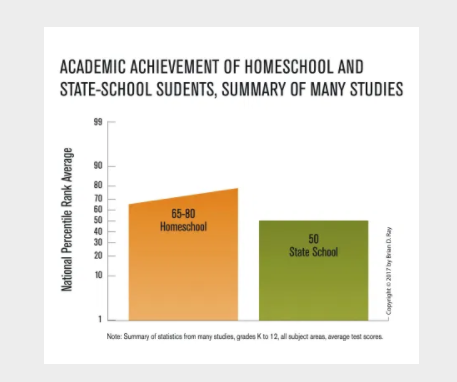
Source Image: Research Facts on Homeschooling
78% of peer-reviewed studies on academic achievement show homeschool students perform statistically significantly better than those in institutional schools.
Final Thoughts On Facts About Home Schooling.
Learning doesn’t only happen in a classroom or in front of a laptop, it happens naturally every single day. And as we have looked at in today’s article there are many benefits to homeschooling.
If you are considering homeschooling your children, be sure to do your research and decide what is best for your family. I would also remember the reason why you are even considering this option, many people will try to put you off and convince you it’s a bad idea. People like to share their opinions about home education even if you don’t ask for it and personally, I find they don’t like to listen to any of the benefits as this isn’t the “norm”
We love home education and don’t care what anyone thinks, in the beginning, it certainly wasn’t an easy decision to make and even now I have wobbles, but seeing my son happy and actually enjoying learning confirms it was the right decision.
Plus we don’t have to go through the anxiety of the school run, tears when leaving, the big build-up to sports day and other school events. My son is happy, he’s learning all the time and has a great circle of friends, plus academically he is doing great and enjoys subjects like maths which he use to hate.
Below are some other articles you may find useful.
Homeschooling Tips For Parents
How much time in school, is actually spent learning?
Hilarious Homeschooling Memes & Videos To Make You Smile
Recommended Resources For Home Educators
Facebook Groups For Home Educators
Finally, if you found our website useful or helpful please share it with other home educators. We are adding stuff all the time to make it a great resource for everyone on their journeys.
Take Care






